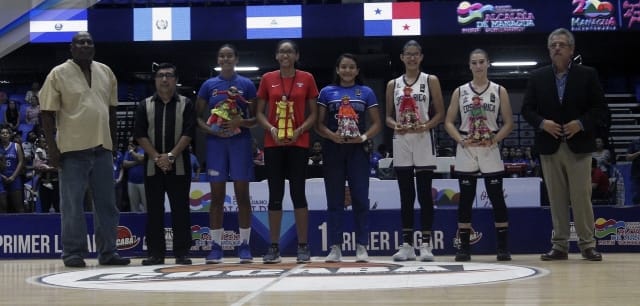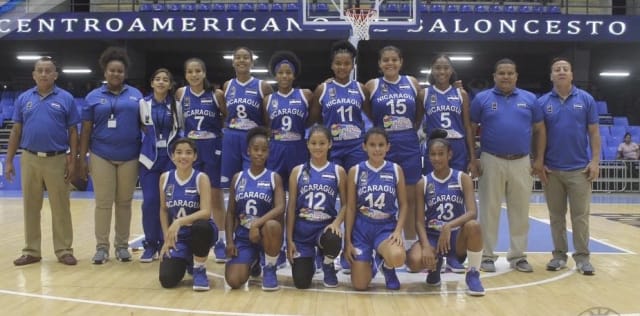Shiannie Brishanty Hebbert, the high-flying Nicaraguan
Fourteen-year-old and 5’9” player Shiannie Brishanty Hebbert is making history in Nicaraguan and Central American basketball. The young athlete is able to catch more than 20 rebounds per game and has shown
MANAGUA (Nicaragua) – Fourteen-year-old and 5’9” player Shiannie Brishanty Hebbert is making history in Nicaraguan and Central American basketball. The young athlete is able to catch more than 20 rebounds per game and has shown this in the COCABA U14 Central American Tournament 2019, which concluded on November 10 at Managua’s Alexis Argüello Sports Complex. Overall, she was outstanding and was the only one from her team selected to the tournament's All-Star Five.

Shiannie is one of Nicaragua's national team's young prospects, and the coaches are setting her sights on her to foster her game development by granting her the tools to bolster the growth of basketball in the Central American nation.
“I was very happy when they gave me this recognition (being a part of the All-Star Five), but I went to the tournament just thinking about winning with my team,” said Hebbert, who plays center and uses her height not only to capture rebounds but also to score.
The national team member was the best in rebounds, with a total of 81, and ended with a 20.3 per game average. She also scored 66 points, made 26 steals, one assist, and six blocks in 132 minutes on the court.
“I started practicing at the age of 10 in an academy, but I currently play with my school. I also like softball. Besides studying and practicing basketball, I learned how to make acrylic nails,” said Hebbert, who's the daughter of Suzy Borden, a former softball player that studied at Ave María College and was also exceptional in basketball in several Central American events, where she was named the MVP.
The national team’s staff, comprising veteran coach Jelmun Estrada, and Julia Lindo and Félix Selva, have been recently on a mission to scout young talents to build Nicaragua’s national teams and be able to dispute continental and international competitions in a near future.
Estrada met Hebbert in 2018 when she was recently the winner of the National Secondary School Games with Instituto Las Perlas, of the municipality of Laguna de Perlas in the autonomous region of Southern Costa Caribe. This also allowed her to represent her country that same year at the Central American School Games (CODICADER) in Panama.
“The year before that I'd gone to Laguna de Perlas to scout several girls. Not for this tournament, but for another plan. In the beginning, there were several permit problems for some of the girls to play at the COCABA in Managua but, thank God, in the end, we could do it and we're very happy with the work they did,” said Estrada to FIBA.basketball.

In the Central American Tournament, Nicaragua lost in their debut against Panama (52-72) with 14 points and 9 rebounds by Hebbert and then suffered another defeat against El Salvador (35-52), despite the double figures (22 points and 28 rebounds) by the player. Then, the Nicaraguans won the following games against Guatemala (54-52 in overtime) with 21 rebounds by Hebbert and concluded the tournament against Costa Rica (43-42) with 18 other points and 23 rebounds.
“She was the queen of the rebounds. She's a girl with a bright future ahead of her, just like Marcela Ulloa, another one of the young Nicaraguan prospects,” said Central American gold medalist Carlos González, who was part of Nicaragua's technical staff in the Central American Tournament.
Hebbert's contributions were decisive, particularly the last one. With 11 seconds left to end the game and with Costa Rica in the possession, Shiannie was able to steal the ball to secure the second win for the Nicas, with a mere one-point difference.
“Minutes before the game ended, I was sat on the bench because I was tired. But I wanted to be there, in the court, helping in the win. I'm happy to have achieved it,” added the national team player.
The Nicaraguan wins against Guatemala and Costa Rica were historic in this category – this was the first time they could defeat these teams in an official international game.
“We achieved one of our goals, which was to play better and stronger. These victories motivate us to keep training and working. This national team is a project for the future. We have plans with young athletes, with the help of Puerto Rican professor David Rosario, so that this work doesn't end here,” added Estrada.
The Nicaraguan national teams, both the female and the male, didn't have much time to train. They did so for a little over a month before the end of the tournament they hosted, and they ended in fourth place with 2-2 for the women and 1-3 for the men.
“This is a group of girls with a lot of limitations. They lack a lot of the fundamentals and in just a month and 20 days of practice you can't teach them everything, and for me, it's a joy everything they've done. This is a work for the future, with two years of practice and some more with international experiences or friendlies there could be another story here. They now have the experience in this tournament of seeing how the game is, the physical contact needed to train strong in the future,” said González.
After the Central American tournament and all the recognition earned by the national team and by herself, Hebbert went back to her eighth-grade classes in her city, Laguna de Perlas. Yet her heart is always focused on basketball and on representing the Central American nation, and she aims to keep growing and achieving her dreams with the sport she chose.
FIBA